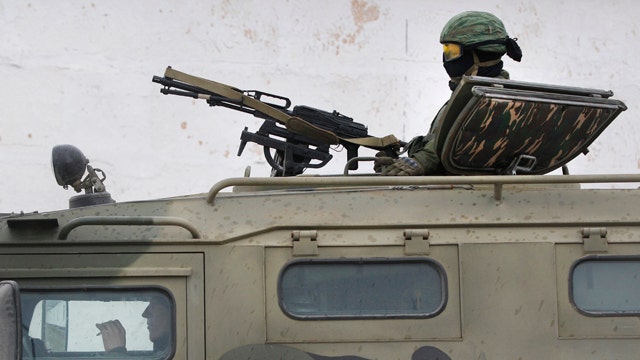US intelligence community caught off guard by Putin's move?
Officials pursue diplomatic options
Republican lawmakers, while stopping short of calling for U.S. military action against Russia, say the Obama administration has another weapon at its disposal that could help Ukraine -- natural gas.
Top-ranking Republicans on Tuesday urged the administration to cut the red tape that has held up the approval process for natural gas exports to key U.S. allies. They argue that by helping Ukraine and European allies end their dependence on Russian energy, the U.S. could ultimately loosen Vladimir Putin's grip on the region.
"We need this action now more than ever before," Sen. Jim Inhofe, R-Okla., top Republican on the Senate Armed Services Committee, said in a statement.
The sudden attention on energy supplies stems from concern that Russia's robust oil and gas exports give it immense leverage over its neighbors. Ukraine gets about half its natural gas from Russia, while Europe gets about 30 percent from Russia.
Sen. John Barrasso, R-Wyo., in warning that this could be used to manipulate the region, noted that a Russian energy firm just threatened to raise gas prices on Ukraine.
But he said U.S. liquefied natural gas supplies are "just waiting" to be exported.
"If President Obama is serious about helping the people of Ukraine, he will immediately expedite the approval process for liquefied natural gas exports," he said. "American natural gas exports would help Ukraine free itself from Russian energy and Putin's political manipulation."
The problem is a complicated Department of Energy permitting process, through which the secretary of Energy can deny applications to countries that don't have a free trade agreement with the U.S.
According to Republicans, the secretary has only approved six applications in the last three-and-a-half years to such countries, and is sitting on two-dozen pending applications.
But part of the problem could be whether the industry is technologically advanced enough to begin boosting exports in the short term. Some also worry about the price impact of allowing these exports.
Energy Department spokesman Bill Gibbons said the administration is already helping Ukraine "in the area of energy security, energy efficiency and energy sector reform," referring in part to a $1 billion loan guarantee announced earlier Tuesday.
"Regarding specific Energy Department actions on LNG exports, the Department remains committed to an expeditious and responsible process," he said in an email. "We continue to make public interest determinations on a case-by-case basis, carefully considering economic, energy security, environmental and geopolitical impacts, among other factors."
House Speaker John Boehner also called Tuesday for President Obama to take the "immediate step" of expediting the approval of these exports.
"The U.S. Department of Energy's excruciatingly slow approval process amounts to a de facto ban on American natural gas exports that Vladimir Putin has happily exploited to finance his geopolitical goals," he said in a statement.
Republicans also pointed to a recent House Energy and Commerce Committee report that noted that with greater natural gas exports, "the U.S. can supplant the influence of other exporters like Russia and Iran."
Aside from urging the DOE to expedite the permitting approval, Barrasso and Inhofe introduced a bill -- in 2013 --- that would give Ukraine, NATO member nations and other countries the same kind of treatment as free-trade partners when it comes to gas exports.
It's unclear how far Putin might be willing to go if the current stand-off in Ukraine's Crimean Peninsula escalates. While some say he can use natural gas supplies as leverage, Russia also benefits from its energy ties with Europe.
According to the Congressional Research Service, Europe is the "most important market for Russian natural gas."
Administration officials are still trying to "de-escalate" the situation, as Secretary of State John Kerry visited the Ukrainian capital of Kiev on Tuesday.
In a press conference, Kerry urged Russia to "return its troops to the barracks" and vowed to "stand with the people of Ukraine" if Moscow will not back down.
Like other U.S. officials, he did not threaten military action, but warned that Russia would be shunned "politically, diplomatically and economically" if it does not "de-escalate" in Ukraine.
"We are not seeking confrontation," Kerry said.





